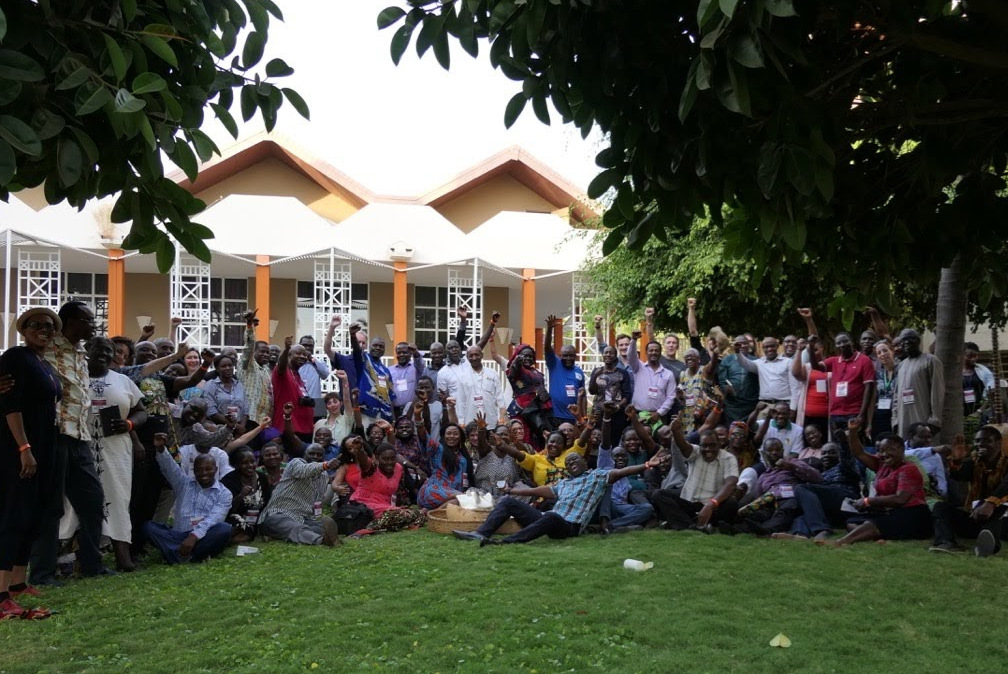
“People Power! People Power Now!”, this was the refrain most heard at the recent Alliance for Food Sovereignty in Africa (AFSA) Conference held in Dakar, Senegal from 4-7 November 2018.
The Conference, unusual for its style using arts-based enquiry and engagement, focussed on the many themes relevant to agroecology, food sovereignty, land rights, and viable and inclusive climate change responses in Africa.
The conference keynotes set the tone for deliberations, poetry, story and art-based forms of representing diversity and complexity, which are key themes in AFSA’s work.
Among the keynotes were Nnimmo Bassey and Pat Mooney, both winners of the Right Livelihood Awards. Pat Mooney warned of things to come, especially the immanent take-over and control of genetic life forms by biotechnology companies who aim to control the very basis of life, effectively rendering local seed knowledge obsolete. He argued strongly for forward thinking systems approaches to activism with a ‘long reach’. Nigerian Nnimmo Bassey - advocate, architect and activist - famous for his activism against oil interests, used poetry and fact to remind us that it is the fossil industrial complex and its forms of operation that have damaged lands, health, ecosystems and whole nations in Africa.
Professor Heila Lotz-Sisitka (SARChI Chair) was humbled to offer a keynote at the conference. Her message was simple. “Avoid monocultures of the mind, don’t forget Africa’s children, reach out to our teachers, include principles and practices of agroecology in all learning programmes, and grow collective agency for change with social learning in all walks of life”. Gertrude Pswarayi-Jabson, national co-ordinator of PELUM Zimbabwe took the conference through a beautifully crafted narrative process of food and earth system appreciation, while Mariama Sonko, who runs hundreds of women’s farmer associations impressed the audience with the stories of change pioneered by women farmers on the continent.
Ably facilitated by a team of arts-based social learning facilitators from South Africa (including Dr Dylan McGarry and Injairu Kulundu - scholars associated with the Chair), participants were able to tell stories, write poetry, map, design plays and model their thoughts on the importance of solidarity in the AFSA movement. This alternative format provided for engaged deliberations, curiosity, and the emergence of strong relations amongst the participants.
AFSA is a broad alliance of civil society actors who are part of the struggle for food sovereignty and agroecology in Africa. It is a network of networks, currently with 35 members active in 50 African countries, reaching around 200 million people. The AFSA is led by a dynamic board and secretariat. The current Director of AFSA is Dr Million Belay - former PhD alumni of the SARChI Chair.
AFSA members represent smallholder farmers, fisher folk, pastoralists, hunter gatherers, indigenous people, faith based institutions, women, youth and sustainably minded consumers across Africa.
Agroecology is key alternative being promoted by AFSA. Agroecology is a people-centred system of sustainable agriculture, combining indigenous knowledge with cutting edge-science. It works within nature’s bounty, using non-destructive methods to produce food that create healthy communities. AFSA actively resists the corporatization of agriculture, pesticides and other monocultural practices that narrow diversity and possibility in African societies.
The benefits of Agroecology are vast - benefits reach far beyond yields. Agroecology embraces complexity, it depends on diversity - both genetic and cultural. It builds on diversity, seeking to regenerate and restore degraded lands, soils and environments for healthier ecologies and people.
The AFSA produces a range of policy analysis tools and research that can be used to strengthen the evidence base of this approach to agriculture in Africa. It is articulating agroecology as a viable solution for real climate action that can offer alternatives in times where land rights, farmer-managed seed systems, and rights to agro-ecological intensification methods ought to be the norm, but are overshadowed by corporate interest and ongoing, unsustainable, often unethical forms of commodification and exclusion.
At the conference a new report on farmer managed seed systems was launched called “The Real Seed Producers”. It’s key message is simple: Farmer-managed seed systems are the principle source of seeds for food crops in Africa, yet national and regional seed policies undermine them. Importantly for education and environmental learning, the report shows that farmers’ seed practices are diverse and knowledge-rich. They are based on the rich cultural heritage and traditional knowledge of local communities, which have been handed down over generations. To hold on to the integrity of knowledge, there is need to strengthen ‘People Power! People Power Now!”. Hence the conference refrain.
This latest report, along with other AFSA materials, can be downloaded on www.afsafrica.org
